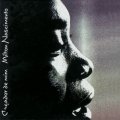Milton Nascimento
- Birth name: Milton Nascimento
- Also known as: Bituca
- Born: 1942-10-26
 Rio de Janeiro, Brazil
Rio de Janeiro, Brazil- Genre: MPB, Pop
- Years active: 1962-present
- Website: www.miltonnascimento.com.br
- Average rating: not rated yet
Users contributing to this page: JanMalysiak
Biography
Milton Nascimento (Portuguese pronunciation: [miwˈtõ nasiˈmẽtu]; born October 26, 1942) is a prominent Brazilian singer-songwriter and guitarist.
Milton Nascimento was born in Rio de Janeiro. His mother, Maria Nascimento, was a maid. As a baby, Nascimento was adopted by a couple who were his mother's former employers; Josino Brito Campos, a bank employee, mathematics teacher and electronic technician and Lília Silva Campos, a music teacher and choir singer. When he was 18 months old, Nascimento's biological mother died, and he moved with his adoptive parents to the city of Três Pontas, in the state of Minas Gerais.
Nascimento was an occasional DJ on a radio station that his father once ran. He lived in the boroughs of Laranjeiras and Tijuca in Rio de Janeiro.
In the early stages of his career, Nascimento played in two samba groups, Evolussamba and Sambacana. In 1963, he moved to Belo Horizonte, where his friendship with Lô Borges led to the Clube da Esquina ("street corner club") movement. Members included Beto Guedes, Toninho Horta, Wagner Tiso, and Flávio Venturini, with whom he shared compositions and melodies. One composition was "Canção do Sal", which was first interpreted by singer Elis Regina in 1966 and led to a television appearance with Nascimento. The collective, as well as some others, released Clube da Esquina in 1972. Several hit singles were also released.
Nascimento's compositions include songs such as "Maria, Maria", "Canção da América" ("Song from America"/"Unencounter"), "Travessia" ("Bridges"), "Bailes da Vida", and "Coração de Estudante" ("Student's Heart"), a song about the funeral of Edson Luís, who was killed by police officers in 1968. The song became the hymn for the Diretas Já social-political campaign in 1984, was played at the funeral of the late President of Brazil Tancredo Neves the next year, and was also played at Ayrton Senna's funeral.
While his reputation within Brazil was firmly established with his Clube da Esquina works, Nascimento's international breakthrough came with his appearance on jazz saxophonist Wayne Shorter's 1974 album Native Dancer. This led to widespread acclaim, and collaborations with Paul Simon, Cat Stevens, George Duke, Quincy Jones and Earth, Wind and Fire. Angelus (1994) features appearances by Pat Metheny, Ron Carter, Herbie Hancock, Jack DeJohnette, Nana Vasconcelos, Jon Anderson, James Taylor, and Peter Gabriel. Through his friendship with guitarist Warren Cuccurullo, Nascimento came to work with the pop rock band Duran Duran in 1993. Nascimento co-wrote and performed the song "Breath After Breath", featured on the band's 1993 album Duran Duran. He also performed with the band in concert when they toured in Brazil in support of that album.
In 1996, Nascimento contributed the song "Dancing" to the AIDS benefit album Red Hot + Rio produced by the Red Hot Organization.
In 2004, he worked with the Brazilian heavy metal band Angra, on the song "Late Redemption" from their album Temple of Shadows..
On June 25, 2019, The New York Times Magazine listed Milton Nascimento among hundreds of artists whose material was reportedly destroyed in the 2008 Universal fire.
Albums:
Comments:
Log in to leave a comment.



